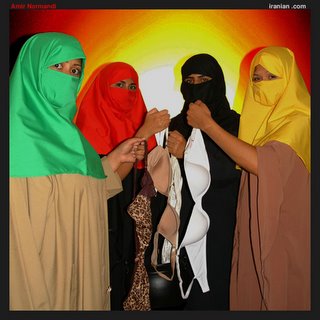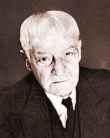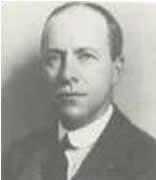
For those who hate the cold isolation of money, machines, modern science, and logical rationality, what could be better than complete submission to ritual and Irrationalist fascism, the giving up entirely of ones mind to the perfection of prescribed behaviours to be repeated five times daily for life, accompanied by fetishistic personal rituals descending into psychopathy, to the prescribed rules and manners for cutting ones finger nails and shaving around ones anus? Ah, Islam: the perfect religion for the perfect people. And now for the true atheist, the one who believes in nothing, the ultimate truth: everything all at once in dhimmi idiocy. No more thinking--ever again. And no one to bother you about it. The complete end of history in a state of Nature, at one with all, a brick of mud in a wall of ignorance impenetrable. Nap time at the kindergaarten of the post-modern world.
And when we awaken to the playground world of Islam we can find something to do to relieve the boredom of our perfect world: we can find fault with each other, with the way in which we are Muslim. We can feign offense, beat, rob, enslave, even kill those we can; and if it all gets to be too boring and worthless to live any longer, we can blow ourselves up in a grand spectacle of teen-age suicide. "We could be heroes, if just for one day."
Ah, Islam: the endless bad (pubic) hair day. We could spend our entire lives fussing over our presentation to the public and Allah. ("Do I really look OK? Are you sure I haven't missed anything? Did I forget to, well, anything?") We could pose. We could look for reasons to take offense and pick fights and amuse ourselves and obsess over the girls we fear. (Did you see her ankle? What a slut.) Best of all, we could pretend that we are the world's finest people. We could strut! (Unless we got nervous that someone's seen us as we really are.) Finally, so long as we never actually do anything no one will ever realize just how poorly we'd be if we did. And why should we, being perfect in the first place?
Agriculture? That's for boring people, those who aren't heroes, who don't have a martial spirit. It's for those who have a soul, though, that is pure and simple, authentic, uncorrupted by city ways and decadence. Agriculture, simple, basic, primitive, in touch with the soil, that is real life for the peasant, pure and simple as he is. The peasant, he who knows his place, is the ground in which grows the national soul. But, should they grow restless or annoying, should they become demanding or rebellious-- corrupt-- one simple gets rid of them and finds a new herd to raise the food and be pure in the land.
Complete conformity. Uniformity. Total obedience. Total control, even over how one shaves around ones anus before prayer time. And this forever without change. This Islamic perfection. This endless endlessness. Submission.
Plato was no great farmer, but he did understand perfection, and therefore he understood how the farmer should be in the world. The farmer should tend the fields that are imitations of the real farm in the realm of the Ideal. This farm, this world, this vile imitation, this is not the real world. To concern oneself with it is to take away ones mind from the important things of the mind contemplating the perfect world of the Ideal. But of course, peasants are mere iron people, not golden ones like philosopher kings who know the truth, hard as it is to bear, and bearable only to the noble.
Enter our Left dhimmi fascists.
There is no right and wrong, that being the idea of an unsophisticated peasant trapped in a false consciousness of capitalism, a person who really doesn't get it, that the real world is unknowable to him, knowable only to the golden ones who've studied sociology and anthropology, and who see the ideal realm of pure idea. There's no right or wrong, but there is some hope of making people behave themselves if only one can put them in the right environment, back to Nature where people rightly belong, where they can be tended and managed and guarded by the golden thinkers.
For those who know the Truth, the real Truth rather than the false opinion held by the peasants and us, there is only control of the stupid, a sleight hope of guiding them to some kind of right behaviour, of orthopraxy, of ritual repeated endlessly. And the Truth, not being possible in this corrupt version of reality, is only grasped by the smartest of the smart. The rest should be left on the land to graze and act out proper rituals at one with nature.
It is the crisis of our times, for the Left dhimmi fascist, that the material world works, and that it works well enough under capitalist economies, under rational agriculture motivated by profit for individuals. That is a crisis because the people are separated from their natural environment -- in a state of nature. The triumphant capitalists, boring and unheroic men and women, live and count money for profit, make machines that are even less real than the natural implements of primitive peasants, those who are already not living in the perfect Ideal realm, live in cities made by man, corrupt and impure, filled with rootless people and Jews. All that should be perfect in the Ideal realm is now made worse by the industries of capitalism and materialism.
And it's at its worst in modern agriculture, the industrialisation of Mother Nature Herself. We must, if we are to please the Left dhimmi fascists, return to the pristine times of pre-industry, and we must let them rule for our own good.
When there was a clear choice between industry and modern agriculture or primitive fascism, as there was in the Balkans from 1500 to the present, what happened when Modernity died and the primitives conquered and ruled?
***
Ottoman Turks overran the Balkans and imposed dhimmitude on those they didn't slaughter. In the world, Columbus sailed off to find a sea route to India, and the Ottomans conquered the Balkans. Western Europe rose as an economic powerhouse and the Ottoman Empire didn't. Neither did the Balkans.
Berend quotes: "The Ottoman system...in the long run... proved to be an obstacle to substantial increases in agricultural productivity and rendered more difficult the transition to the capitalistic mode of production." (Adnair 1989, 142-56.)
The Ottoman empire was thus not just another type of economic regime, and it was definitely not a successful agricultural empire in terms of modern agricultural and capitalistic transformation in the early modern centuries. In fact, it was a serious burden and and obstacle to the kind of modernization that Ataturk's revolution aimed to achieve after World War I.
The worst long-term consequence of being incorporated into the Ottoman empire was virtual exclusion from the emerging world system, isolated in a rigid Ottoman bureaucratic-military regime that eschewed private ownership.
Balkan societies were mutilated during the half-millennium of Ottoman rule. The elite became a bureaucratic-military Ottoman class. They were joined by a group of partly Islamized Balkan mediators who served as spokesmen for the local peasantry and assisted the Ottoman elite with tax collection.... "Balkan Christian locals," Maria Todorova observes, "were integrated into the bureaucracy only at the lowest level, if at all," so that there was a "lack of political elites in the Balkans" (Todorova 1997. 171.) Balkan societies thus became "incomplete societies," scarcely more than huge peasant communities. blood relations remained the main organizational principle, and the peasants live in extended families or communal units, working together and dividing the fruits of their labour equally. Since their surplus products were in effect confiscated, the peasant communities relied on a subsistence economy with practically no market connections. Neither the peasants nor the spahis who were responsible for tax collection engaged in improving agricultural methods or increasing output.
The Balkans remained almost entirely rural, but small towns with limited merchant-artisan populations emerged. In the centralized Ottoman empire, the esnafi system, a strict guild-type organization, controlled what was produced and in what quantity, blocking any kind of unauthorized change. Prices were fixed, and profit was limited to then per cent....
The Balkans, dominated by a subsistence-communal economy, could not join the world system. (Berend: pp. 25-26.)
In the cloud-cuckoo-land of the Romantic Left dhimmi fascist, all of the above Islamic wrecking of the Human programme is a good thing. And this parody of Humanity is not going to stop so long as our Left dhimmi fascists and their naive allies continue to pander to the worst in people: the privileging of idiocies over reason, the liking of horoscopes over astronomy; the love of tarot cards over genetics; the worship of Mother Nature over physics, biology, and chemistry; the favoring of intuition over logic; feeling over reason; submission to Allah over Human freedom. And the worst of it all, the love of the phantasy of the mediocrities among us for some utopian nightmare world in which all people are toys for them to arrange in rows and play with as they wish. When the intelligentsia turns to phantasy, when they turn to people into figurines in a sandbox, then it is time for the people to rise up and put the mediocrities in their place. there is nothing nice about Nature. It is an objective reality, and nothing more, not a spirit, not a mother, not a good thing. Nature is force, and it kills what comes of it objectively. Nature has no mind, no soul, no love of anything at all. It is brute force. It is up to the intelligence and creativity and energy of Man to make nature do as he will.
The Balkans, caught between East and West, was captured by and subjected to Islam, to primitivism. It is that primitivism that our Left dhimmi fascists so deeply admire and wish to turn the entire world back to, against our revolutions of modern progress. Modernity is not natural, and that is to the good. But our Left dhimmi fascists disagree, and they work hand in glove with other fascists to return our people to the fold of the primitive herd.
From the nineteenth century on, national historiography has traditionally blamed the Ottoman conquest for Balkan backwardness. The conquerors destroyed grain growing villages in the lowlands and decimated the population, the argument goes; the survivors supported themselves by raising animals. The consequence of Ottoman occupation was thus the depopulation of the Balkans and a reversion to seminomadic pastoral life (Lampe and Jackson 1982)
The arrival of the Ottomans was a calamity of unparalleled consequences because it disrupted the natural development... isolated the peninsula from European development and left it untouched by the great ideas and transformations... [bringing] a deep cultural regression and even barbarization. (Todorova 1997, 182.)
The Ottomans destroyed the development of the Hungarian state and nation by their three hundred years of wars.... The Ottoman rule is the most severe, moreover, probably the only major catastrophe of Hungarian history.... (Szekfu 1935, 498-99, 584) (Berend: p. 22.)
Ottoman Islam reduced the Balkan people to the state of animals, and to this day they have not recovered; and more, the Muslim threat continues to swarm over the land again. For the Left dhimmi fascist in his utopian daydreams of the perfect world in touch with Mother Nature and all people living in harmony with the cosmos, anti-capitalist, anti-Modernist, this is what the dhimmi desires and fights for: the utter ruin of our world as we have made it from the state of nature.
These past seven essays on modern agriculture are in preparation for our coming posts on ecology and environmentalism. It is our hope that we have brought enough light to the subject so far that the reader will see clearly in the coming posts that Modernity is unnatural and determined by the actions of man against nature; and that in opposition to man against nature is the Left dhimmi fascist and the barbarian Islamic umma bent on suicidal charges against our revolutions of progress for all Mankind.





![[TypeKey Profile Page]](http://www.jihadwatch.org/dhimmiwatch/nav-commenters.gif)







